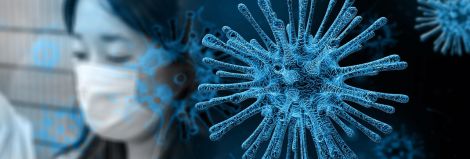Coronavirus / Health board defends its testing regime, as the number of confirmed coronavirus cases becomes ‘political’
NHS SHETLAND has moved to reassure the public after the number of confirmed cases of coronavirus shot up to eleven amid an increasing amount of people venting their frustration on social media over how testing is being carried out.
The Scottish Government said on Friday afternoon that the number of confirmed cases had remained unchanged at six, a statement that was immediately challenged by local people.
NHS Shetland quickly corrected the figures upwards to eleven making Shetland one of the worst affected areas in Scotland by population, if not the whole of the UK.
However, the health board then found itself to be at odds with the Scottish Government policies and was instructed to recall its earlier statement and revert the figure of confirmed cases back to six.
To be clear, there are eleven confirmed cases of coronavirus in Shetland, but the political figure at the moment is six.
In addition to the number game, local folk have taken to social media over the last few days expressing their frustration with the extent of testing which appears to be at odds with recent scientific advice that the coronavirus can easily be transmitted long before symptoms show.
NHS Shetland has repeatedly declined to reveal the number of tests that have been carried out locally, saying patient confidentiality could not be guaranteed, as numbers were too small.
Many islanders have put themselves into self-isolation as a precaution but would preferably be tested. Requests, however, remain unanswered.
Interim medical director Brian Chittick said the health board had been preparing for the number of confirmed cases going up and that is why the country had now moved to the ‘delay’ phase, and with it a change in the testing protocol.
Become a member of Shetland News
He said he was aware of the view that more extensive testing should have been carried out far earlier to contain the spread of the virus, but added that the health board is and has been following the advice from the national experts.
“We are working according to the best evidence that we have got and that evidence was that those who are showing symptoms and had one of the risk factors such as travelling through one of those countries or has had close contact with the risk profile that we were set by Health Protection Scotland,” he said.
With the move to the ‘delay’ phase not even people with symptoms are being tested anymore but advised to go into self-isolation for initially seven days.
“If you are showing the symptoms of a persistent cough or fever then you should self-isolate for seven days. On the eighth day you can no longer self-isolate if you have been fever free for two days,” Chittick said.
With regards to a different testing regime he said the number of tests carried out had to strike a balance with the laboratory capacity available, as otherwise “by the time we get the results most people will be better anyway”.
“So there is a balance which makes the management of this new virus so difficult because a lot of people have mild symptoms, so they may not even realise that it is coronavirus that they have,” he said.
Chittick confirmed that all eleven local cases were self-isolating and looked after in the community.
“It is important to reiterate that for the majority of people the effect of the exposure to the virus is mild, and most people recover well, but that shouldn’t detract from the fact that for a minority it can be a serious infection and that is why we are preparing as much as we can both in the community and the hospital for those kind of cases,” he said.
“The community response has been very sensible and very supportive in trying to contain this virus as much as possible.
“So when I am reading about local shops now starting to deliver, and start hearing how people are looking after vulnerable community members, I think that is exactly what you would expect of Shetland.”
There is a long list of cancellations and postponements of social event across Shetland. Details can be found here.
Meanwhile NHS Shetland has provided the following Q&As which we are publishing here in full:
The advice seems to be changing about what I should do if I am concerned I have been exposed to someone with Covid-19. Should I ask for testing?
No. If you do not have symptoms you should continue as normal, taking good respiratory and hand hygiene precautions such as using and disposing of tissues and hand washing.
If I know I have been in contact with someone with confirmed COVID-19 even if I don’t have any symptoms should I self-isolate?
No. You do not need to contact your GP or Public Health. Please follow the general advice with regard to good respiratory and hand hygiene.
If I have symptoms of a persistent cough or fever should I self-isolate regardless of whether I think I may have been in contact with a confirmed case?
Yes. Measures brought in from today, Friday, March 13 ask all those showing even mild symptoms – new persistent cough or fever/temp – to self-isolate for 7 days. There is no need to call a GP or NHS24 unless your symptoms significantly worsen or if you have underlying conditions. Mild illness can be expected to last 4-5 days and should clear thereafter, hence the 7 days isolation then return to normal.
Why has this advice changed?
This is intended to delay wider population spread, reduce the peak of infection rates and push it back for a few weeks so that services are not overwhelmed. It also helps avoid infectious people being in contact with elderly or vulnerable people.
I’ve been self-isolating but I feel ok now – when can I stop?
Advice has changed so that if you have been self-isolating this can end on Day 8 after the onset of symptoms if you are feeling better and you have had no fever for 2 days. If a cough is the only persistent symptom on Day 8 you can return to work (as a post-viral cough is known to persist for several weeks in some cases).
If you are no longer testing why do you still need the health pod outside the Gilbert Bain Hospital?
Some people are unwell, with a variety of respiratory symptoms and may be advised by their GP or NHS24 to attend the A&E Department. If this is the case, A&E staff may decide that using the health pod is the best environment to undertake the initial health assessment to minimise the potential spread of infection.
Should I visit someone in hospital?
If you think you are showing any signs of illness (and not just those relating to coronavirus) please do not visit the hospital. At this time we would like to minimise the number of people in the hospital to reduce the spread of infection so would ask that visitors are restricted to immediate next of kin and carers at this time.
Become a member of Shetland News
Shetland News is asking its readers to consider paying for membership to get additional perks:
- Removal of third-party ads;
- Bookmark posts to read later;
- Exclusive curated weekly newsletter;
- Hide membership messages;
- Comments open for discussion.
If you appreciate what we do and feel strongly about impartial local journalism, then please become a member of Shetland News by either making a single payment, or setting up a monthly, quarterly or yearly subscription.








































































